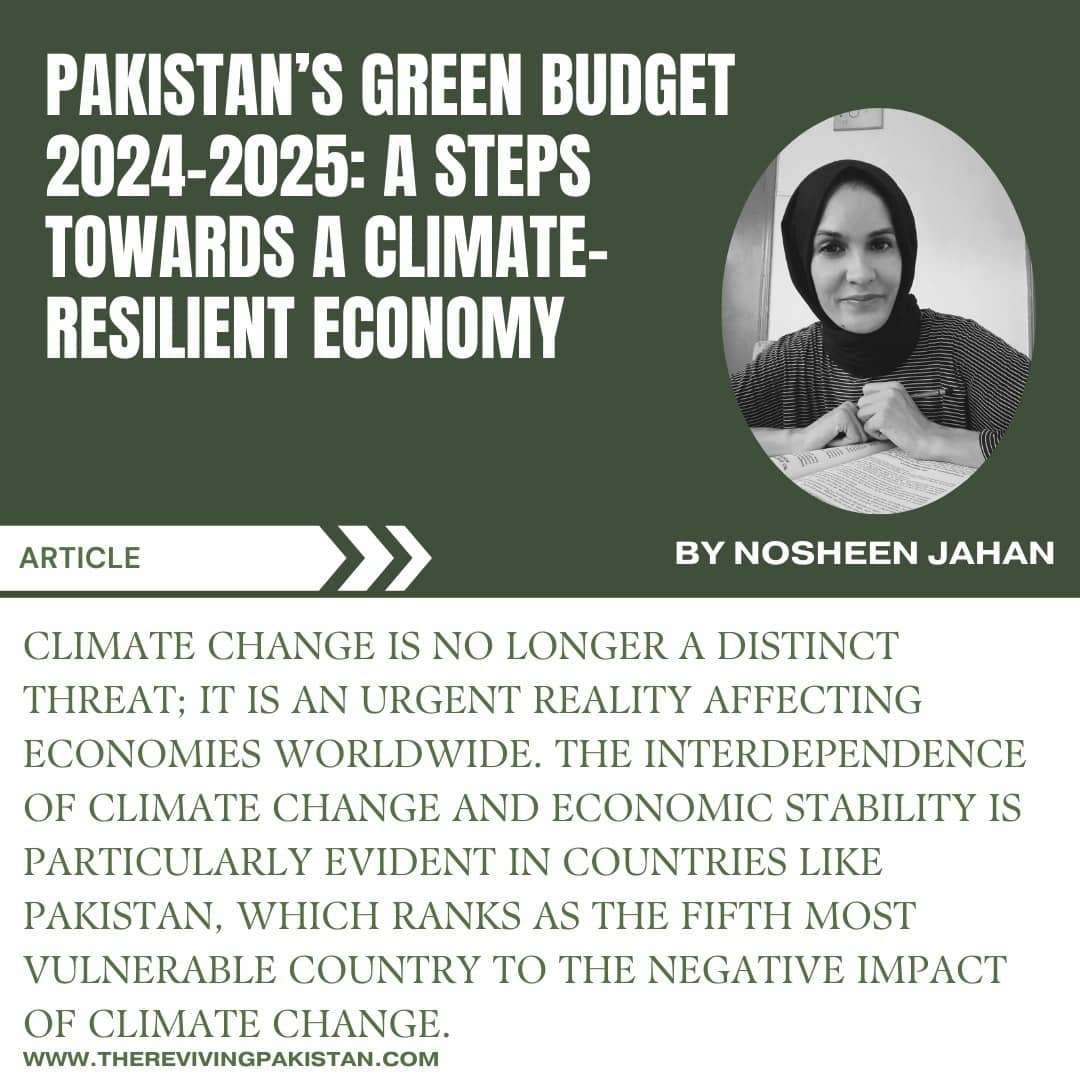About the Author(s)

Nosheen Jahan
Author is an environmental activist and writer focusing on conservation and sustainability. A Fellow-ENV Pakistan and UNLEASH Talent, she advocates for climate action, environmental justice, and the rights of vulnerable communities and ecosystems.
Climate change is no longer a distinct threat; it is an urgent reality affecting economies worldwide. The interdependence of climate change and economic stability is particularly evident in countries like Pakistan, which ranks as the fifth most vulnerable country to the negative impact of climate change. This vulnerability underscores Pakistan’s need to proactively mitigate environmental risks and build a resilient economy. One such measure is the implementation of green budgeting strategies, a pivotal step for Pakistan’s fiscal policy in the 2024-2025 budget.
The Interplay between Climate Change and the Economy
Addressing environmental crises is not just an environmental imperative but also an economic necessity. The adverse effects of climate change can devastate key economic sectors, as evidenced by the 2022 disaster in Pakistan. This calamity caused widespread damage and financial losses estimated at over USD 30 billion, leading to a sharp decline in exports, and exacerbating water and food insecurity. In the northern regions, flash floods caused significant damage to homes and infrastructure, impacting tourism, which is a crucial revenue source for the country.
At the COP28 summit, developing countries, including Pakistan, emphasized the need for the loss and damage funds from developed nations. These funds are essential to compensate for the adverse impacts of historical emissions by industrialized countries, which have disproportionally affected vulnerable nations. The call for such financial support is not only a matter of climate justice but also a practical necessity to help developing countries build resilience against future climate shocks.
IMF Directives for Green Budgeting
In response to Pakistan’s continuous pursuit of international financial support at the Conference of Parties (COP28), the International Monetary Fund (IMF) has urged Pakistan to incorporate a green budgeting directive into its economic framework, harmonizing its fiscal policies with environmental sustainability and climate resilience. The IMF has directed Pakistan to advance green budgeting, tracking, and publishing climate-related expenditures, and to extend a green tracking system to all provinces. Additionally, Pakistan is required to conduct a long-term fiscal sustainability analysis under different climate change scenarios, assess discrete fiscal risks, and allocate development budget funding based on comprehensive selection criteria that include climate change impact and resilience. The IMF has also emphasized the need to strengthen the capacity of relevant institutions, including the Ministry of Climate Change, Planning Commission, and Climate Change Authority, to oversee and coordinate projects aligned with the National Climate Change Policy and Nationally Determined Contributions (NDC) goals. Therefore, by recognizing the magnitude of climate challenges, and following IMF directives, Pakistan acknowledges the need for integrating climate change considerations into fiscal policies and presented the budget for fiscal year 2024-2025 to the National Assembly on June 12, 2024, with the allocation of resources strategically aligned with green budgeting objectives. With a commitment to sustainability, Pakistan designated a substantial portion of its budget to drive environmental stewardship and climate action. Thus, for Pakistan, the shift towards green budgeting is not merely a policy choice but a necessity for survival and prosperity.
Green Budget Highlights
The fiscal budget for 2024-2025, includes increased allocations for environmental protection, which is allocated Rs.7252 million for 2024-2025, compared to Rs. 1142 million in 2023-2024. However, research funding is completely neglected under the breakdown of the allocated budget. The Medium-Term Budgetary Statement 2024-2025 includes significant allocations for climate change mitigation and disaster risk management. The budget includes several measures to integrate climate considerations into policy decision-making and allocate funds for climate-sensitive areas:
- Climate Budget: The federal government has adopted a climate budget as a governance system to integrate climate consideration into policy decision-making. This approach ensures that financial resources are allocated to initiatives that promote sustainability, reduce carbon emissions, and enhance the country’s capacity to adapt to climate change.
- Climate-Sensitive Budget: The budget allocates 7.7% of the Running of Civil Government (ROCG) and 15.3% of Public Sector Development Programme (PSDP) funds for climate-sensitive areas to tackle climate change in FY2024-2025. The government aims to ensure that the climate-sensitive budget does not fall below 8% of ROCG and 16% of PSDP in the medium term. This indicates that the government is taking a longer-term approach to integrating climate change considerations into its budgeting processes rather than just focusing on the immediate fiscal year.
- Budget Tagging: The finance ministry has successfully tagged over 5,000 federal government cost centers under three major classifications (adaptation, mitigation, and other supporting areas) and 40 minor sub-classifications based on the National Climate Change Policy. This detailed tagging process helps to ensure that funds are effectively directed toward climate-related initiatives.
- Economic Diversification: The government plans to introduce climate-resilient infrastructure and new industries to build a greener economy and strengthen fiscal resilience. This includes investments in renewable energy, sustainable agriculture, and eco-tourism, which can diversify the economy and reduce dependency on vulnerable industries.
- Natural Disaster Funds: The medium-term budgetary statement also includes provisions for the establishment of a National Disaster Fund to mitigate the financial impact of natural disasters such as floods. For FY 2024-2025, the government allocated 4.5% of the ROCG and 1.8% of the PSDP to disaster-sensitive areas. This fund aims to provide financial support for rehabilitation and reconstruction efforts following natural disasters.
Economic Benefits of Green Budgeting
Pakistan’s economic benefits from green budgeting are substantial. By integrating climate change considerations into economic policy and budgeting, the country can ensure fiscal sustainability, promote sustainable development, and enhance its competitiveness in the global market. Thus implementing a green budget can stimulate economic growth in several ways:
- Green budgeting helps Pakistan manage fiscal risks associated with climate change and environmental degradation. By assessing and disclosing these risks, the government can make informed decisions and allocate resources effectively to mitigate these risks.
- Green budgeting prioritizes sustainable development by allocating resources toward climate action and environmental protection. This approach ensures that economic growth is environmentally sustainable and socially responsible.
- Green budgeting promotes transparency by quantitatively assessing and disclosing environmental and climate-related risks. This transparency enhances accountability and informs decision-making processes.
- A green energy policy can help Pakistan reduce its dependence on imported fuels, lowering the cost of energy and reducing foreign exchange reserves.
- Green investments diversify its economy and can create new employment opportunities in sectors like renewable energy, sustainable agriculture, and environmental conservation.
- It also enhances energy security, allocating significant funds to develop solar, wind, and hydro-power projects, promoting sustainable agriculture, and boosting food security by providing subsidies for organic farming and investing in water-efficient irrigation systems, strengthening infrastructure to withstand extreme weather events, including flood defenses and climate-resilient roads and buildings.
- By adopting green budgeting, Pakistan can enhance its competitiveness in the global market, attracting foreign direct investment (FDI) and expanding trade horizons.
- Green budgeting improves public health by reducing air, water, and land pollution, enhancing environmental quality, and promoting sustainable development.
Challenges and Recommendations for the Implementation
Pakistan’s fiscal budget 2024-2025 has indeed adopted green budgeting strategies to address climate change and support economic development, however, it does not explicitly commit to climate-smart finance mechanisms like green bonds, green loans, or debt-for-climate swaps. The budget also neglects the research funding, which was Rs.220 million in the 2023-2024 budget. While the funds for climate-sensitive areas represent an improvement, they may still be insufficient to address the scale of the climate change challenge facing Pakistan. Additionally a critical question remains about the implementation, whether the government successfully executes this strategy? To ensure the effective execution of green budget commitments, the following steps must be adopted by the government:
- The government must strengthen its capacity to assess and manage climate-related risks through a clear and comprehensive vision for climate-resilient investments, and more specific targets and strategies to achieve the stated goals.
- The government should increase the allocation of funds for climate-sensitive areas, with a clear road-map to reach the target of 8% of ROCG and 16% of PSDP in the medium term.
- The government should establish a high-level coordination mechanism, with clear roles and responsibilities for different agencies, to ensure effective implementation and monitoring of the green budget.
- Pakistan requires international support to strengthen its domestic public and private sources and provide the right support for green industrialization.
With strong political will, effective coordination, and sustained commitment, Pakistan can lead the way in green budgeting and set an example for other countries facing similar climate change challenges.
Conclusion
Pakistan, a country vulnerable to climate change, faces significant economic challenges. Green budgeting, a strategic approach that integrates climate and environmental considerations into budgetary practices, offers a systematic means to mitigate financial risks associated with climate change and environmental degradation. Pakistan’s green budgeting initiatives aim to integrate climate change consideration into economic policies and budgetary practices. The fiscal budget for 2024-2025 includes significant allocations for climate change mitigation and disaster risk management. By embracing a green budget, Pakistan can align its fiscal policies with climate and environmental goals promoting resilience, sustainability, and long-term economic growth.

